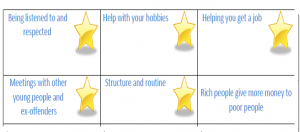impact
 The ideas from the research were used to improve local services through a local action committee that involved managers, workers and young people. Local authorities have also used the idea of participatory research to codevelop further evaluations with young people.
The ideas from the research were used to improve local services through a local action committee that involved managers, workers and young people. Local authorities have also used the idea of participatory research to codevelop further evaluations with young people.
-
evidence
 We found out about nine things that help young people stay out of trouble.
We found out about nine things that help young people stay out of trouble.
- Good relationships between YOT workers and young people
‘if you don't get on with your YOT worker it's not going to work out... if I didn't get along with [my worker] I wouldn't turn up for my meetings I'd probably still be getting in trouble but because I get along with her. She's, it's helping me out a lot more, I can talk to her basically.’
- Engaging with family
‘if your YOT worker gets on well with your parents …then you, you form a bond, it's like that trust circle in'it? It opens up a bit more because you think well yeah, my parents trust them maybe I can trust them that little bit more. And if, if they get on well and they're chatting and that then it's like it's a good thing because then it makes you feel better about yourself. ‘
- Structure and Routine
‘... I had targets set out for me and I had to achieve. That was with (Worker 1) and that, … to keep myself busy and stuff, like just playing football, just not hanging around with them kind of people.’
- Practical Help
‘because some people don't even know what they're entitled to. I don't know what I'm fully entitled to at the moment so you should know like what you're entitled to and how it's all going to work and stuff like that.’
- Health and Emotional Wellbeing
‘I don't know like, sometimes like you can say to a YOT worker, yeah, yeah, yeah, I'm fine but really you're not, like you want, in a way you kind of want someone to recognise it, the health services would recognise it’
- Education, Training and Work
‘They helped me get my coaching, coaching qualification and that. . They put me, they put me on a course …, to do NVQ level one, for football and sport, like gym and that, so done that, then they put me onto another one … for my FA level one coaching so . .’
- Role models
‘[Where I go for education] the staff that they have up there are all people that have, really that have offended and they want to get back and …the way I see it they've done worse than me when they were my age and they've done something with their life, so if they can do it easy, I should be able to do it. ‘
- Prison, Restorative Justice and Community Work
‘ yeah, with mine, with mine, what I did, my offence, I've actually, I spoke to [the victim] and she's, she like described it to me. And like I felt really bad about myself, that I made her feel that way. Erm, yeah, but, I think that's how people would benefit from that, I did myself.’
- Participatory Strengths-Based Approaches
Over three quarters of the young people who discussed this theme thought being asked what help you need and being given that help would reduce re-offending. Some described being enabled to take a lead in identifying their problems and solutions.
You can read about our research here 'Just putting me on the right track': Young people's perspectives on what helps them stop offending.
-
advice
 Young people involved with this research developed a card game to help other young people in contact with youth justice services to choose the issues they wanted to talk about. Young people dealt the cards or picked them from a pile and threw them away if they did not want to talk about the issue. Sometimes they put the cards in order of priorities.
A young person presented our evidence to a committee that ran local youth justice services. He then joined a planning group to action plan how to make changes happen. The advice from this report has been used to improve services.
Young people involved with this research developed a card game to help other young people in contact with youth justice services to choose the issues they wanted to talk about. Young people dealt the cards or picked them from a pile and threw them away if they did not want to talk about the issue. Sometimes they put the cards in order of priorities.
A young person presented our evidence to a committee that ran local youth justice services. He then joined a planning group to action plan how to make changes happen. The advice from this report has been used to improve services.
 The ideas from the research were used to improve local services through a local action committee that involved managers, workers and young people. Local authorities have also used the idea of participatory research to codevelop further evaluations with young people.
The ideas from the research were used to improve local services through a local action committee that involved managers, workers and young people. Local authorities have also used the idea of participatory research to codevelop further evaluations with young people. We found out about nine things that help young people stay out of trouble.
We found out about nine things that help young people stay out of trouble.
 Young people involved with this research developed a card game to help other young people in contact with youth justice services to choose the issues they wanted to talk about. Young people dealt the cards or picked them from a pile and threw them away if they did not want to talk about the issue. Sometimes they put the cards in order of priorities.
A young person presented our evidence to a committee that ran local youth justice services. He then joined a planning group to action plan how to make changes happen. The advice from this report has been used to improve services.
Young people involved with this research developed a card game to help other young people in contact with youth justice services to choose the issues they wanted to talk about. Young people dealt the cards or picked them from a pile and threw them away if they did not want to talk about the issue. Sometimes they put the cards in order of priorities.
A young person presented our evidence to a committee that ran local youth justice services. He then joined a planning group to action plan how to make changes happen. The advice from this report has been used to improve services.

